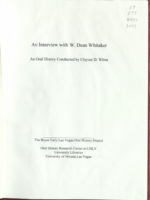Search the Special Collections and Archives Portal
Search Results

Jimmy Lee oral history interview: transcript
Date
Archival Collection
Description
Oral history interview with Jimmy Lee conducted by Vanessa Concepcion, Kristel Peralta, and Stefani Evans on May 25, 2021 for Reflections: The Las Vegas Asian American and Pacific Islander Oral History Project. Jimmy shares his family's history as entertainers and producers in Korea and their migration to the United States when Jimmy was six years old. He talks about their move to Durham, North Carolina and their relocation to Las Vegas, his education, and his current business, mentorship, and philanthropic pursuits. Subjects discussed include: Arirang Sisters; Jo Mackey Sixth Grade Center; Nevada's tax structure; Commercial Center.
Text

Richard C. MacDonald interview, September 20, 2016: transcript
Date
Archival Collection
Description
Henderson developer and Philadelphia native Richard MacDonald is a natural storyteller, and he has stories to tell. The man behind MacDonald Highlands and the Dragon Ridge Country Club first moved to Las Vegas as a young teen with his parents in 1959. After graduating Las Vegas High School in 1963, his parents moved to Hawaii and he enrolled at Nevada Southern University (now UNLV) and supported himself in Las Vegas by selling unfinished houses. His parents convinced him to move to Hawaii, where he attended the University of Hawaii worked with his father selling blocks of pre-developed cemetery lots to Asian buyers. In this interview, MacDonald describes his experience as a white man facing racial discrimination, of Las Vegas as Hawaii's Ninth Island, of earning his real estate broker's license, and of his father's plan to develop and sell Las Vegas property to Hawaiians. Returning to Las Vegas, MacDonald worked with Frank Sala and Chuck Ruthe to obtain his first two sections of Henderson land, which became Sun City MacDonald Ranch and the western part of MacDonald Highlands. He talks of developing Sunridge at MacDonald Ranch on Eastern Avenue and The Canyons at MacDonald Ranch. He also speaks to local prejudice against Hawaiians and to the way the City of Henderson favored Hank Greenspun and American Nevada Corporation. He recalls his twenty-year experience as a developer with the City of Henderson, its planning commission, city manager, city attorney, and city council. He reveals associations with Del Webb and the Del Webb CEO, Anthem, the Bureau of Land Management (BLM), the Sultan of Brunei, and polo fields as well as Red Alerts, the Foothills project, and MacDonald Highlands. Along the way he talks of golf course architects and planners and the MacDonald Highlands golf course, his family, the Great Recession, and his current status with the City of Henderson and the Archaeological Institute of America.
Text

Transcript of interview with Ronald "Ron" Lurie by Stefani Evans and Claytee D. White, October 17, 2016 and November 10, 2016
Date
Archival Collection
Description
Ron Lurie is a product of Las Vegas. Ron Lurie knows Las Vegas. The Los Angeles native arrived in Las Vegas with his parents when he was twelve years old; his father opened Market Town next to White Cross Drug Store. Lurie graduated from Las Vegas High School in 1958 and attended Nevada Southern, where he played baseball and basketball before joining the United States Army Reserves. Returning from training, he began working at a new store, Fantastic Fair. Soon the owner, builder Lloyd Whaley, asked him to manage a new Fantastic Fair. At 24 years of age, he managed the entire Fantastic Fair store, which later became Wonder World. Over time, Lurie would manage three of the four Wonder World stores. In this interview, the former mayor of the City of Las Vegas and former Las Vegas City Council member talks about running for City council because he wanted more parks and ball fields downtown and about his political career, which coincided with the years of explosive growth in the 1970s and 1980s. The current vice president and general manager of Arizona Charlie's also v discusses his careers in the grocery business and in gaming; he speaks to giving back to the community and the changing demography of the area surrounding Arizona Charlie's; he talks of the ways Steve Wynn pioneered an aura of glamour that helped to upgrade Downtown Las Vegas; he recalls the challenges of public safety, regional transportation, flood control, and the Monorail and of civic dreams of a magnetic levitation train that would connect Downtown Las Vegas to Cashman Field. He remembers his parents and his wife; he talks about his children, and he shares vignettes of, among many others, Ernie Becker IV, Bill Briare, Al Levy, Steve Miller, and Bob Stupak. Throughout, Mayor Lurie especially beams when he talks about his family, his friends, his work, Las Vegas, the Boys and Girls Clubs, and baseball. This man loves baseball.
Text

Mike Montano interview, September 19, 2008: transcript
Date
Archival Collection
Description
First played in Las Vegas with Jack E. Leonard in 1960. Only worked at two hotels during his 24-year Las Vegas career - Flamingo and riviera
Text

Transcript of interview with Dr. Fiona Kelley by Lisa Gioia-Acres, March 21, 2009
Date
Archival Collection
Description
Dr. Fiona Kelley was born and raised in Connecticut. Her parents were both teachers (though her mother quit teaching to raise their two daughters), and Fiona recalls the European vacations the family took every summer, exploring castles and enjoying picnic lunches. Fiona was educated at Greenwich Academy in Connecticut and Bard College (dance major with art history minor) in New York. She mentions dancing in Acapulco and California and then auditioning and being hired as a cover dancer for Hallelujah Hollywood! at the MGM in Las Vegas. Meanwhile, she had also become licensed in massage and states that as she was making the transition from dancing to production of dance, she and her husband were invited to China. While in China, Dr. Kelley recalls visiting a hospital which specialized in the treatment of AIDS through acupuncture. This led to a decision to learn Oriental medicine, which she pursued once she returned to the United States. She shares many details of her studies
Text

Transcript of interview with Mitchell A. Cobeaga by Raymond E. Frey, March 14, 1976
Date
Archival Collection
Description
On March 14, 1976 Raymond E. Frey interviewed Vice President of Nevada State Bank, Mitchell A. Cobeaga (born December 11, 1917 in Lovelock, Nevada) at Mr. Frey’s home in Las Vegas, Nevada. This interview covers early life in Nevada and the history of the Nevada State Bank. During this interview Mr. Cobeaga also discusses education in Nevada in the twenties and thirties, and Southern Nevada’s influence over the rest of the state.
Text

Transcript of interview with Florence McClure by Joanne Goodwin, January 24, 1996 & February 6, 1996
Date
Archival Collection
Description
Florence McClure came to Las Vegas later in her life, but the state felt her presence and the community her contributions as if she were a native daughter. Introduced to the League of Women Voters in 1967, McClure met her political mentor Jean Ford and learned how to practice the core elements of democracy. She put those tools to work in a number of ways, however her participation in the creation of the Rape Crises Center and her advocacy for locating the women’s prison near Las Vegas are two of her long-lasting efforts. Florence Alberta Schilling was born in southern Illinois where she enjoyed the security of a tight-knit family and the independence to test her abilities growing up. She graduated from high school and attended the MacMurray College for Women at Jacksonville. With the attack on Pearl Harbor in 1941, she began a series of jobs working for the war effort. She moved to Ypsilanti, Michigan with a girlfriend to work at the Willow Run Army Airbase and then moved to Miami, Florida where she worked for the Provost Marshall in the Security and Intelligence Division. She met her husband, James McClure, at the time and they married in 1945. During the next several years, they raised a family and moved around the country and to Japan with the military. McClure came to Las Vegas in 1966 as part of her work in the hotel industry which she engaged in after her husband’s retirement from the military. She had worked in California and Miami Beach, but it was Burton Cohen in Los Angeles who invited her to join him in a move to Las Vegas to build the new Frontier Hotel and Casino. Following the completion of the Frontier, she moved to the Desert Inn with Cohen in 1967 and worked as the executive office manager. After a few years, she decided to leave the industry and complete her college education. She graduated from UNLV in 1971with a BA in Sociology with an emphasis on criminology. She was 50 years old. McClure had been a member of the League of Women Voters for a few years at that point and had learned the political process from Jean Ford and workshops on lobbying. She had numerous skills that were waiting to be tapped when she attended an informational meeting on the incidence of rape in the Las Vegas valley. From that meeting, a small group of individuals, including McClure, began the organization Community Action Against Rape (later renamed the Rape Crisis Center) in 1973. It was the first agency in the area devoted to serving individuals who had been assaulted and changing the laws on rape. The organization’s first office was set up in McClure’s home. Over the next decade, she worked to change attitudes and reshape policy by constantly raising the issues of sexual assault with police officers, emergency room doctors, judges, and legislators. Her role as an advocate took her into hospital emergency rooms and courtrooms to assist victims. It also took her to the state legislator to lobby repeatedly for a change in laws. During this period, journalist Jan Seagrave gave McClure the nickname “Hurricane Florence” - a fitting moniker that captured the force with which McClure attacked the issue. As a result of her efforts and those of the people with whom she worked, we now 1) recognize rape as a crime of assault; 2) forbid the sexual history of a rape victim from being used against her in court; and 3) recognize marital rape. In addition to learning about Florence McClure’s activities, the reader of this interview will gain information on the role of civic organizations like the League of Women Voters in engaging the voluntary efforts of women in the post-war years.
Text

Transcript of interview with Dean Whitaker by Claytee White, April 5, 2010
Date
Archival Collection
Description
William Dean Whitaker was born in 1925 and raised in a suburb of Los Angeles, California. Dean, as he is known, talks briefly about his parents and his brothers, for his youth quickly ended when he joined the Air Force and became an aviation cadet once he had turned 18 years old. The year was 1943 and World War II was raging. He became a member of the 398 th Bomb Group and flew twenty missions before being captured by the Germans. In this oral history, Dean talks with vivid recollection of the day he was captured and details of being a POW in Germany. Among his anecdotes are those of his mother's unwavering belief that he would return home, the humanity of a German soldier, and of meeting Gen. George Patton. Included are photos and excerpts from his personal history of his life during the war. Dean and his wife Lucille moved to Las Vegas in 1990.
Text

Myron E. Leavitt interview, March 14, 1978: transcript
Date
Archival Collection
Description
On March 14, 1978, collector Thomas Neill interviewed Myron E. Leavitt (born October 27th, 1930 in Las Vegas, Nevada) at his law office in Las Vegas, Nevada. In this interview, Leavitt discusses his law practice and running for various positions in Las Vegas, Nevada. He also speaks about growing up, playing sports, and coaching multiple sports in Las Vegas.
Text

Joseph C. Mattingly interview, February 23, 1979: transcript
Date
Archival Collection
Description
On February 23, 1979, collector Sean Powers interviewed Joseph C. Mattingly (born April 21st, 1912 in Texas) at his home in Las Vegas, Nevada. In this interview, Mr. Mattingly discusses working construction on many buildings in the Las Vegas and Henderson areas in Nevada. He also talks about being a member of a motorcycle club and about air conditioning in the early days.
Text
